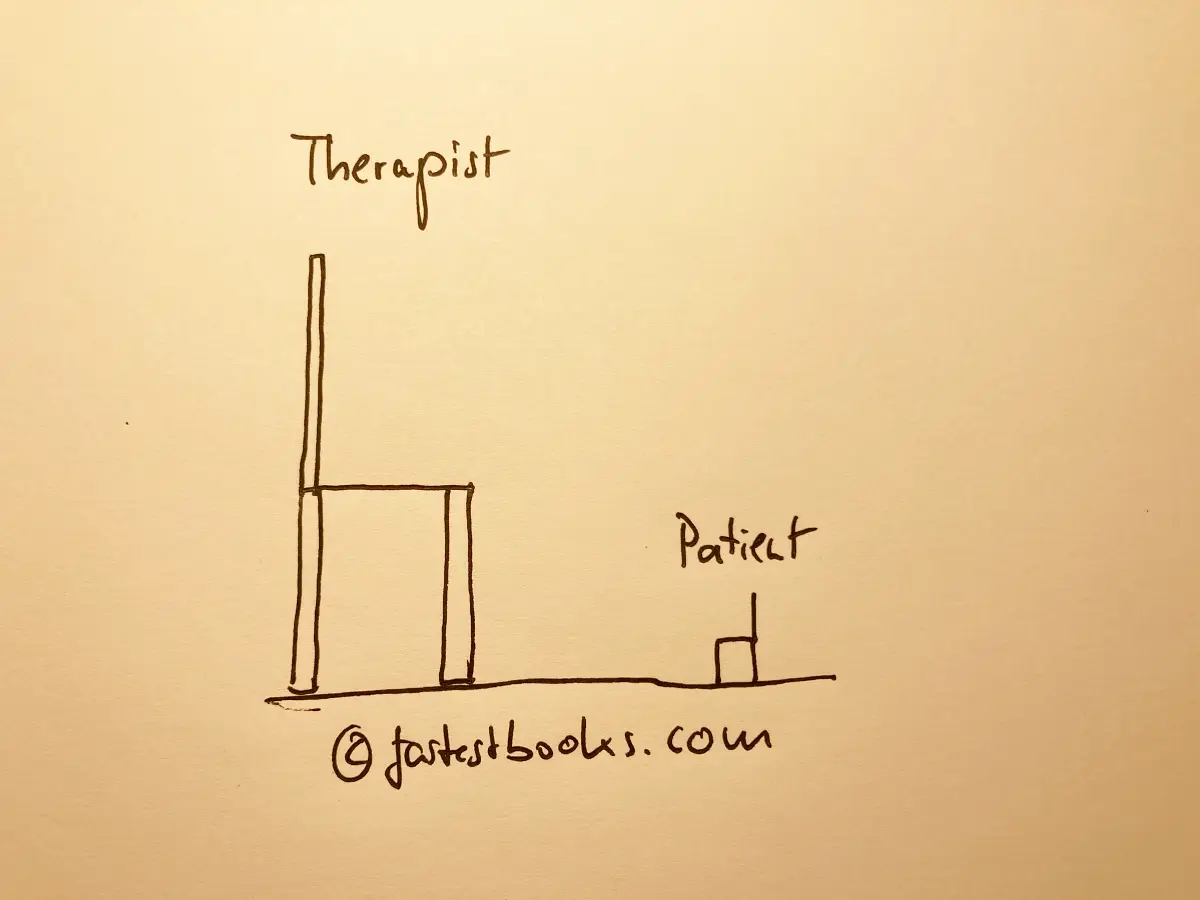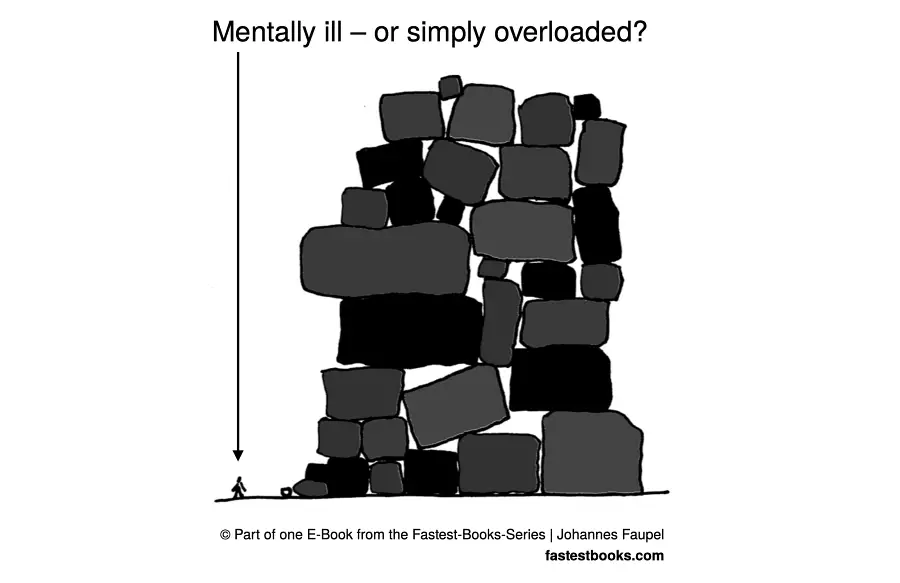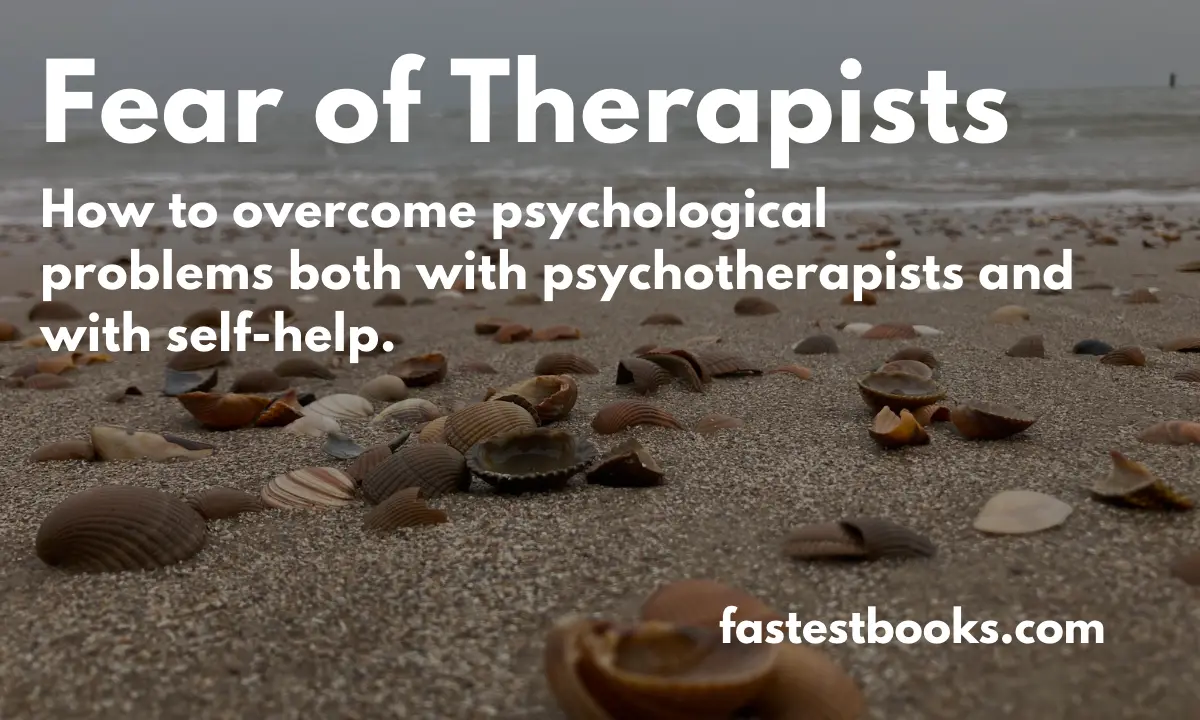Fear of Therapists: Origins, Issues, and Consequences
Fear of therapists, also known as therapophobia or iatrophobia, is a common phenomenon experienced by individuals who are hesitant to seek help from psychotherapists and mental health diagnosis. While it is normal to feel apprehensive about therapy, fear of therapists can hinder a person’s ability to receive adequate treatment for their mental health concerns. In this blog post, I will explore some of the origins, issues, and consequences of fear of therapists.
Are You Scared of Therapy?
It is normal that many feel nervous and anxious before the first talk to a therapist. Starting therapy for the first time while not knowing enough about psychotherapy can lead to the common “fear of the unknown”. Some may fear to re-experience the symptoms that could bring about a crisis again.
Be confident.
At the bottom of this page, you will find an overview of typical topics people are talking to a therapist.
Afraid of fear therapy?
The statement “afraid of fear therapy” may seem paradoxical at first glance. It suggests that someone who wants to overcome fear is also afraid of the process of doing so.
However, upon closer examination, this fear is not a contradiction. The fear of fear therapy is not necessarily a fear of the therapy itself, but rather a fear of what the therapy may uncover. The fear of facing one’s fears can be overwhelming and daunting, especially if the fear has been deeply ingrained for a long time. This fear may also stem from a fear of failure or disappointment if the therapy does not work as expected.

Why afraid of psychotherapy?
Therapy is about positive changes. So, the core goal of therapy or self-help is not to eliminate fear entirely, but rather to manage it in a healthy and productive way.
The ideal result of therapy or self-help on fear is to learn to live with a certain amount of fear, as fear and anxiety are normal human emotions that serve a protective function. Through therapy, individuals can gain the tools and skills to manage their fears and lead fulfilling lives.
What is the “Mental Health Journey?”
The term “Mental health journey” refers to the ongoing process of managing and improving one’s mental health. This can involve seeking professional help, developing coping strategies, and making lifestyle changes to promote mental well-being. Each individual’s way to health is unique, as experiences with mental health challenges and recovery vary. Similar to physical health, maintaining and improving mental health requires attention and care. So, the individual way to find help or self-help may include a range of experiences, such as ups and downs, obstacles and achievements, and periods of stability and growth.
Mental Health Journey: Summary |
|
|---|---|
| Aspect | Details |
| Definition | The mental health journey refers to an individual’s ongoing process of understanding, coping with, and addressing their mental health needs and challenges. |
| Importance | Recognizing and addressing mental health is crucial for overall well-being, relationships, and daily functioning. |
| Stages | Awareness, Acceptance, Seeking Help, Recovery, and Maintenance. |
| Challenges | Stigma, lack of resources, societal pressures, and personal fears or misconceptions. |
| Support | Therapy, medication, support groups, self-care practices, and a strong support system. |
It may involve acquiring the ability to recognize and manage symptoms of mental health conditions, as well as developing healthy habits and self-care practices that enhance mental well-being. Although it may be a bit difficult at times, it’s important to remember that seeking help and taking steps towards recovery is a courageous and vital action.
What are the Origins of Fear of Therapists?
The fear of therapists can stem from a variety of factors, including negative experiences with therapy, cultural beliefs, and personal values. For some individuals, a negative experience with a therapist or mental health professional can leave a lasting impression and make them reluctant to seek help in the future. For others, cultural or religious beliefs may discourage seeking therapy or cause them to view mental health issues as a sign of weakness.
Additionally, some people may fear therapists because they feel vulnerable and exposed during therapy sessions. The idea of sharing personal information with a stranger can be daunting and make them feel uncomfortable. These concerns can be compounded by fears of being judged or misunderstood by the therapist.
Origins of Therapy Fear – Summary |
|
|---|---|
| Aspect | Details |
| Definition | Fear of therapists, also known as “therapophobia,” refers to the anxiety or apprehension one might feel about seeking or attending therapy sessions. |
| Common Origins | Past negative experiences with therapists, societal stigma, fear of judgment, and concerns about confidentiality. |
| Impact | Can deter individuals from seeking necessary mental health support and treatment. |
| Overcoming the Fear | Researching therapists, seeking recommendations, understanding therapy processes, and open communication with potential therapists. |
| Support | Support groups, online forums, and discussions with loved ones can help in alleviating fears and misconceptions about therapy. |
What Problems Can Arise from the Fear of Therapists?
One of the main issues with fear of therapists is that it can prevent individuals from getting the help they need. Mental health concerns can significantly impact a person’s quality of life, and without proper treatment, these issues can worsen and lead to more significant problems down the line. Fear of therapists can also exacerbate feelings of isolation and hopelessness, making it challenging to build meaningful relationships and achieve personal goals.
In addition to the personal impact, fear of therapists can also have wider societal implications. Stigma surrounding mental health issues can prevent individuals from seeking help and contribute to the pervasive notion that mental health concerns are not as legitimate as physical health issues.
What might be Common Consequences of not visiting a Mental Health Professional?
The possible consequences for patients of not visiting a counseling of therapy depend on the kind of stress of the person. The consequences of fear of therapists can be different.
Common Consequences of not visiting a Mental Health Professional: Summary |
|
|---|---|
| Aspect | Details |
| Definition | The potential negative outcomes that may arise when an individual avoids seeking professional mental health support. |
| Physical Health | Untreated mental health issues can lead to physical health problems such as sleep disturbances, weight gain or loss, and weakened immune system. |
| Relationships | Strained relationships with family, friends, and colleagues due to mood swings, withdrawal, or unpredictable behavior. |
| Work and Productivity | Decreased productivity, frequent absences, or potential job loss due to inability to cope or concentrate. |
| Substance Abuse | Increased risk of turning to drugs or alcohol as a coping mechanism, leading to addiction or dependency issues. |
| Quality of Life | Reduced overall life satisfaction, increased feelings of isolation, and potential for self-harm or suicidal thoughts. |
Some clients succeed with self-help.
How can someone change an important thing without specific training and a treatment plan?
Some patients decide not to talk about their problems in a psychotherapy to a complete stranger. They rather want to find the origins of their problems and the fears related.
Some other individuals may struggle without adequate treatment to manage their mental health concerns and experience symptoms that negatively impact their daily lives.
These symptoms can include anxiety, depression, and substance abuse, among others. In severe cases, untreated mental health concerns can lead to suicidal ideation or attempts.
Additionally, fear of therapists can prevent individuals from achieving their personal and professional goals. Mental health issues can affect an individual’s ability to perform well at work or maintain healthy relationships, which can have a lasting impact on their overall quality of life.
What might be the first step to cope with common fear?
The first steps to cope with daily fear without therapy might be to integrate fear in daily life. If patients want to avoid the mental health stigma (mental illness), they can start by trying out what their own pace might look like.
Before finding the right therapist, one can talk to close friends in a safe space – and then think about a first session – if necessary.
Fear is emotionally involved in the personal life. It is not possible to erase fears related to things you are concerned about.
It is possible for a good therapist to build a relationship between the conscious patient with his feelings and emotions to the ego-state who is living. So a safe therapeutic environment can arise.
The goal of therapy maybe instead of being worried about the therapist, to accept anxiety in the same way as stress has to be accepted.
A good preparation for a coaching or a psychotherapy might be the reading of one or more e-books from the Fastest-Books-Series.

Mentally Ill Or Overloaded?
Conclusion: Fear of Therapists
In conclusion, fear of therapists can be a significant barrier to receiving adequate mental health treatment. Understanding the origins, issues, and consequences of this fear is crucial in addressing and overcoming it.
Read also:
Finding new coping skills
Why a lot of “mad” thoughts are completely normal
What is not a sign of any mental illness?
For whom is this article helpful? |
This article is beneficial for individuals who experience fear or apprehension about seeking help from psychotherapists. It addresses those who might be hesitant to undergo therapy due to various reasons, including past negative experiences, cultural beliefs, or personal values. |
What issues might one face prior reading this article? |
Before reading this article, one might grapple with the “fear of the unknown” associated with therapy, especially if they are unfamiliar with the psychotherapy process. This fear can stem from concerns about re-experiencing symptoms that may trigger a crisis or apprehensions about what the therapy might uncover. |
What insights can readers get from this text? |
Readers can gain a deeper understanding of the origins and implications of the fear of therapists, also known as “therapophobia.” The article sheds light on why some individuals might be afraid of therapy, emphasizing that the core goal of therapy is not to eliminate fear but to manage it healthily. It also introduces the concept of the “Mental Health Journey,” which refers to the ongoing process of managing and improving one’s mental health. Furthermore, the article provides insights into the potential consequences of avoiding professional mental health support and offers suggestions on how one can begin to cope with their fears. |
What other pages on this website are helpful to understand all context |
Help Yourself: Free Reading Sample About Burnout Here – Free Download |




